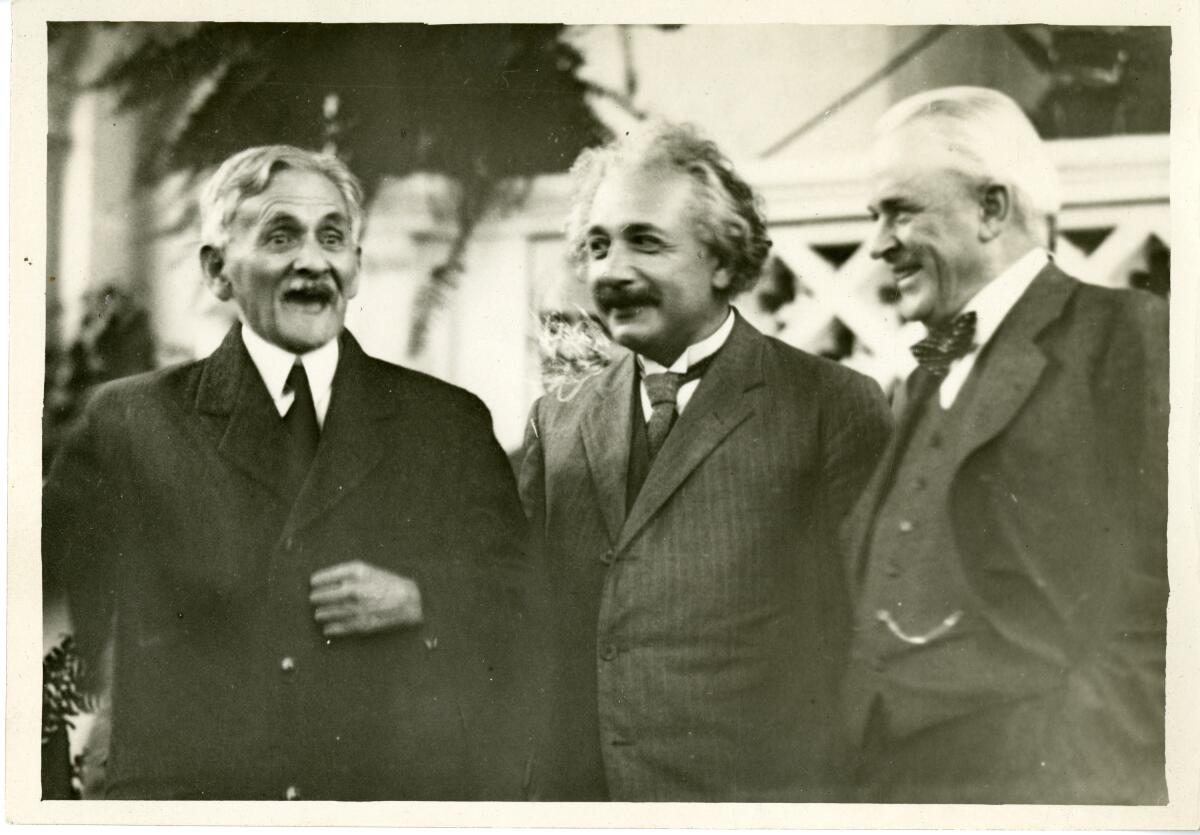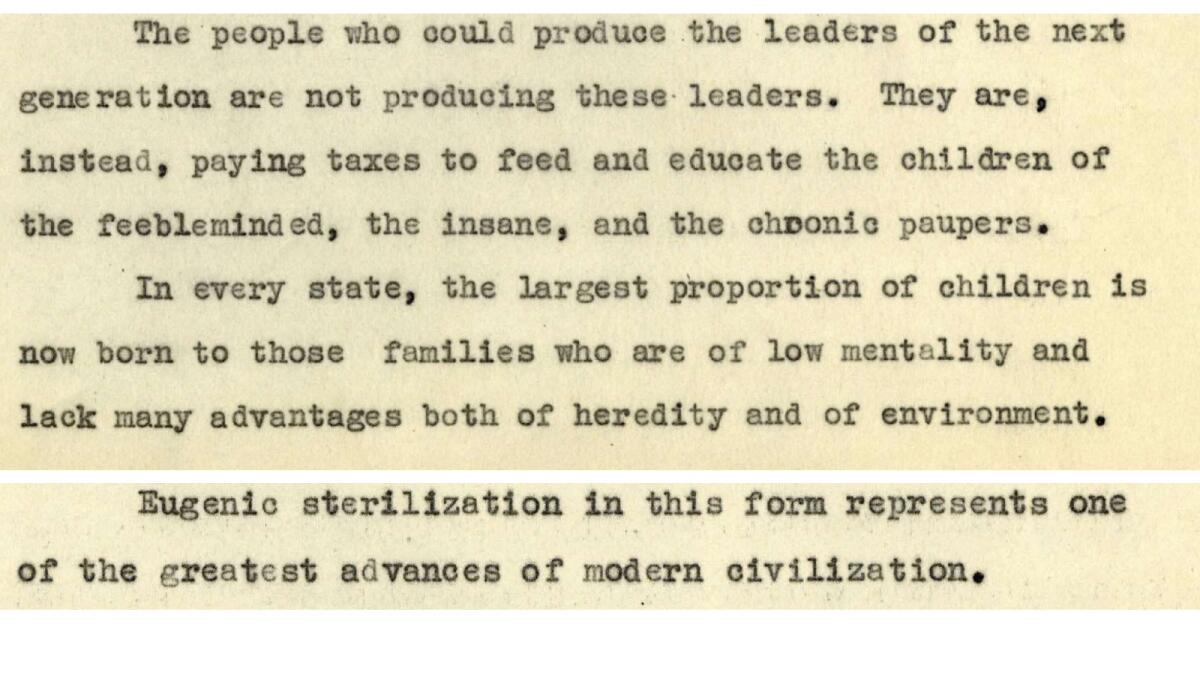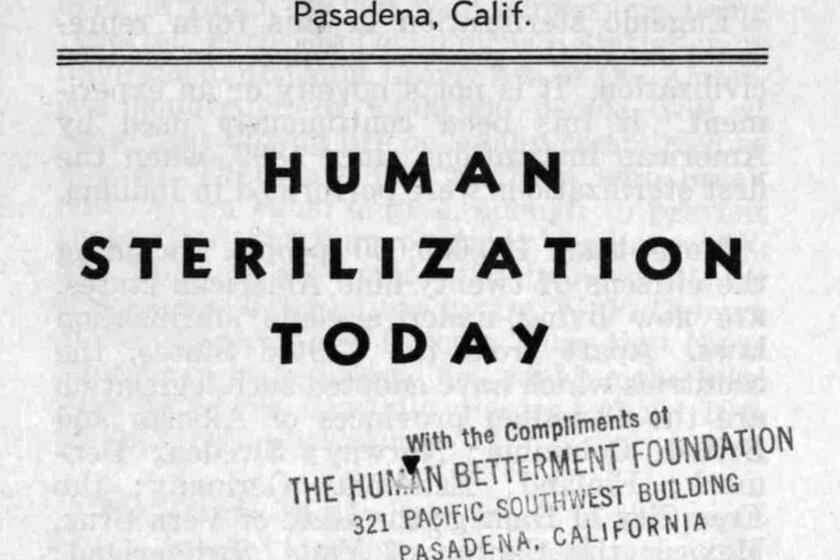Column: Caltech’s effort to confront its racist past hits a snag

- Share via
At first blush, the California Institute of Technology seemed to respond promptly and well to the uproar sparked this summer over its apparent complicity with the racist eugenics movement of a century ago.
Caltech, one of the nation’s leading scientific research institutions, took steps to increase diversity in its undergraduate and graduate programs, publish data on diversity at all levels from faculty appointments to undergrads, and improve its institutional response to discriminatory behavior.
The Pasadena university also established a task force to examine its policies on naming campus buildings.
The membership of this committee neither has the background nor is willing to address institutional racism at Caltech.
— Caltech student Sarah Sam, upon resigning from its Naming Task Force
This was aimed directly at the disclosure that its venerated former president, Robert A. Millikan, had been an officer of the pro-eugenics Human Betterment Foundation, which promoted forced sterilization and racial segregation.
A petition seeking to remove the name of Millikan and others associated with the foundation from campus buildings and programs has been signed by 1,083 members of the Caltech community, according to its organizer, Michael Chwe, a UCLA faculty member and Caltech alumnus.
But Caltech’s effort to come to terms with racism in its past has run into a snag.
The so-called Naming Task Force has been rattled by the resignation of one of its members, Sarah Sam. A doctoral student in neurobiology who is president of Black Scientists and Engineers of Caltech, Sam was the only Black student on the 15-member task force, which comprises faculty, alumni, students and administrators.
Sam announced her resignation on Sept. 28 with a broadside in which she asserted that “the membership of this committee neither has the background nor is willing to address institutional racism at Caltech.”
Caltech’s revered Robert Millikan favored forced sterilization. Can the university come to grips with its past?
She suggested that some committee members seemed intent on minimizing the impact of eugenics and the Human Betterment Foundation on the victims of sterilization.
Some even tried to rationalize eugenics as standard intellectual thinking in Millikan’s era and compulsory sterilization as “an artifact of limited scientific understanding during the early 20th century,” she said.
Sam alleged that “several committee members are eugenics apologists,” though she didn’t identify them. “Many of our meetings have centered around the question, ‘To what extent is eugenics wrong/racist?’” — a question that one would think had long been settled by the eugenics movement’s role in racial policies of the Nazi regime in Germany.
A few days after Sam’s resignation, Caltech President Thomas F. Rosenbaum responded with a statement that seemed to intensify her disillusionment. Rosenbaum acknowledged that Millikan had been “associated with the morally reprehensible eugenics movement.”
But without mentioning Sam by name, Rosenbaum wrote that “a number of members of our community have expressed impatience with the process of canvassing disparate opinions and debating their merit. ... We grow stronger as a community when we use the tools of learning to move beyond the incapacitating polarization so prevalent today.”
Rosenbaum’s statement glossed over Sam’s point that the committee members had been ignoring the perspective of the victims of forced sterilization in which Caltech was complicit. “I thought it was wildly insensitive,” she told me.

On Tuesday, task force Chair Benjamin Rosen, an alumnus and veteran venture capital investor, responded more directly to Sam with a statement expressing “regret ... that the process disillusioned her.”
Rosen observed that the task force has been at work for only two months, that its responsibility is “multifaceted and complex,” and that “one cannot infer any conclusions at this point.”
Task force members I reached out to either didn’t respond or begged off commenting because the panel is still at work, with its deliberations conducted behind closed doors. It’s expected to issue its recommendations by the end of this year.
All this points to the complexities inherent in Caltech’s efforts to confront its past. On the one hand, the efforts may have resulted in a broader awareness of the institution’s history of exclusion of women and people of color from its faculty and student body.
That history arguably ties in with Caltech’s association with eugenics to the extent they “share some underlying belief in the hierarchy of humanity,” says Peter Collopy, Caltech’s university archivist.
Caltech’s effort at reckoning with its past is part of a trend underway at many institutions, including The Times. Here’s the context.
Few figures have as towering a reputation at their academic institutions as Robert A. Millikan does at Caltech. Millikan, who died in 1953, served as Caltech’s president for 24 years, longer than anyone else.
The implicit racism of a Chapman professor’s op-ed should pose a problem for Chapman itself.
A Nobel laureate in physics, Millikan helped establish the school’s worldwide reputation. During his lifetime, he was also a leading public intellectual; his name still adorns schools and streets around the Southland.
Millikan’s involvement with the Human Betterment Foundation is less well-known. The foundation was the creation of Ezra S. Gosney, who had settled in Pasadena with a fortune from farming and real estate and established the organization in 1929.
A few years after Gosney’s death in 1942, his family bequeathed its assets, which included real estate holdings and a document archive, to Caltech.
The foundation was an unabashed promoter of compulsory sterilization of women it deemed “feebleminded” or prone to criminality, citing the pseudo-science of eugenics to justify the practice as a “practical, humane, and necessary step to prevent race deterioration,” to quote one of its pamphlets.
In part due to the foundation’s efforts, California became a leader in the American sterilization movement. By 1938, its forced sterilization law resulted in more than 12,000 involuntary sterilizations, nearly half of all those nationwide. By 1979, when the state law was repealed, some 20,000 sterilizations had been performed.
Millikan was not a charter member of the Human Betterment Foundation, but became a trustee in 1937. He joined a board that included Rufus von KleinSmid, then the president of USC; Lewis Terman, a Stanford psychologist who pioneered the study of IQ; and Harry Chandler, the publisher of the Los Angeles Times.
Some of Millikan’s defenders, according to Sam, have suggested that he didn’t fully buy into its programs but may have joined the foundation as a favor to Gosney. Some have pointed to the dearth of overt statements of support for sterilization in Millikan’s papers.
Justice Gorsuch joins the push for ‘civility’ in debate, which is always aimed at shutting down debate
But archival research, much of it associated with the renaming issue, points to overt racism on Millikan’s part.
In a speech he delivered in 1924, four years into his tenure as Caltech’s president, he stated that “California is today ... the westernmost outpost of Nordic civilization. The problem of the relations of our race to the Asiatic races is the big race problem of the future. California must inevitably contribute largely to the solution of that problem.”
In a 1951 letter written during a visit to Mississippi, he told his wife, Greta: “More than half of the population in this state is made up of negroes — a very serious situation. For it means that under universal suffrage they could control the state now — an unthinkable disaster in view of the sort of people they now are.”
Both documents were displayed Oct. 2, launching a series of public events aimed at helping members of the Caltech community grasp the broader issues in its history.
“Tackling the historical legacy and the political dimensions of something like eugenics can’t possibly be done in a committee setting,” says Maura D. Dykstra of Caltech’s history department, the organizer of the Oct. 2 event.
“An institution that prides itself as much as Caltech does on reasonable and open discourse ought to have a conversation about the legacy of eugenics from which all of us can learn,” alongside the narrow issue of whether to rename buildings on campus, Dykstra told me.
Among the archival materials displayed at the Oct. 2 event were several documents tracing Caltech’s battle with federal officials in 1970 and 1971 over discrimination against women and minorities in its faculty appointment and student admission practices.
The University of California regents are wrestling with a question that should have an easy answer: Should they approve an “affiliation” between UC San Francisco, one of the leading teaching hospitals in America, and Dignity Health, a Catholic hospital chain that openly discriminates against women and LGBTQ patients and requires its doctors to comply with religious directives, some of which run counter to medical science and ethical practice?
The Department of Health, Education and Welfare upbraided Caltech for its lack of affirmative action. On a faculty of 487, the agency noted, only 35 were women and only eight of those had the seniority of “voting” members of the faculty. None had tenure.
Caltech agreed, begrudgingly, to step up its recruitment. As one administrator acknowledged in an internal memo displayed in the recent event: “Clearly, science will not be irreparably damaged by the inclusion of more women.”
He also advised against challenging HEW’s conclusions. “We may lay ourselves open to trouble if we maintain that discrimination has never occurred,” he wrote. “It would be all too easy to prove the contrary.” But he maintained that discrimination against women had been “partly unconscious.”
Caltech hasn’t progressed far enough from its history of discrimination, the Black Scientists and Engineers asserted in a June 25 statement that helped to prompt the institution’s stock-taking; of 1,299 graduate students, only 11 were Black, the organization stated.
Caltech, moreover, has lagged well behind other institutions in ending their memorialization of eugenics promoters. USC has removed KleinSmid’s name and bust from a central building on its downtown Los Angeles campus. Just Tuesday, Pomona College announced that it has renamed its Robert A. Millikan Laboratory building to honor the Seaver family, the structure’s original benefactors.
The Palo Alto school district has voted to take Terman’s name off a middle school. Pasadena’s Neighborhood Unitarian Universalist Church, which Millikan co-founded, last year removed his name from a room in its building.
At Caltech, Sam says that while she was on the renaming committee, it was still grappling with such fundamental questions as, “How do we separate the scientist from the man?”
She says her conviction that one could not distinguish a person’s career from his or her character “was not shared by my fellow members.” Some would ask, “Are we going to rename a building every time we disagree with their politics?” she says. “The implication there was that eugenics ideology and committing crimes against humanity was simply a matter of politics, not ethical standards.”
It’s not hard to understand the quandary Caltech faces in making a clean break with Millikan. “There’s a mythology about Millikan on campus,” Chwe observes. “I was part of that mythology. We were taught that he was a great man, so when I first heard that he was a eugenicist, I felt a little betrayed.
“But you can’t teach students that people are worthy of respect when they’re not. Then you’re just implicating them in your mythology.”
Chwe notes that when some 70% of Californian children are people of color and nearly 50% are Latino, the costs of alienating potential future scientists are great.
“Science is about the future,” he says. “It’s much more important to encourage people to go into science and become the next great scientist than to hold on to our little personality cult of Millikan.”
More to Read
Inside the business of entertainment
The Wide Shot brings you news, analysis and insights on everything from streaming wars to production — and what it all means for the future.
You may occasionally receive promotional content from the Los Angeles Times.













